Anatomy of an Era: Bryan Pruitt Part 3
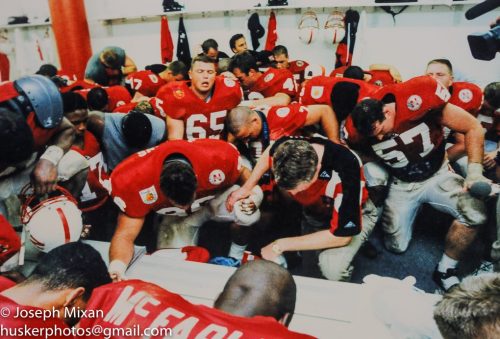
Excerpted from Chapter 3, No Place Like Nebraska: Anatomy of an Era, Vol. 1
Bryan Pruitt Part 3
Walk-on, Offensive Guard, Midlothian, Illinois (St. Laurence)
Author: Bryan, anybody behind the scenes play a large role in your development?
BP: From an academic standpoint, I’ll be the first one to say Dennis Leblanc in Academics. That guy was instrumental in getting me developed. For me? I can’t give him enough credit, what he did behind the scenes.
Here’s an example: we played Florida State in the ‘92 Orange Bowl. I didn’t do so hot in school that semester. Dennis probably came to me during practice and said something like, ”Wait until after the game.” I remember on the plane going back to Lincoln he walks up to me on the plane and says, “Hey Bryan, what happened to your grades last semester?” And I remember playing dumb like, ‘What do you mean?’ “Well, you got an F in this and you didn’t pass that. Unless you pass 16 hours next semester you’re gonna be ineligible.”
How’s that for a flight home, having all that on your mind? To me it was just the way Dennis would motivate the guys. He would pick the right time to do it. And then he would pick the right time and say, “Hey, you screwed up. You gotta get your ass in gear.” And it took me enough time, I had a tough time.
It took me 5½ years to get my degree. So I graduated and I go up and get my diploma. I walk back to my seat and open it up, and there’s a card in there from Dennis and Keith Zimmer. It says, ”Congratulations! We knew you could do it.” That will always stick in my mind. I know there was nobody else had a card in their diploma, but I did. They didn’t have to push you, but they did. Especially if you were a walk-on. They could have focused all their time on the scholarship guys, but they didn’t. They pushed everybody. Like I said, I owe a lot to those guys.
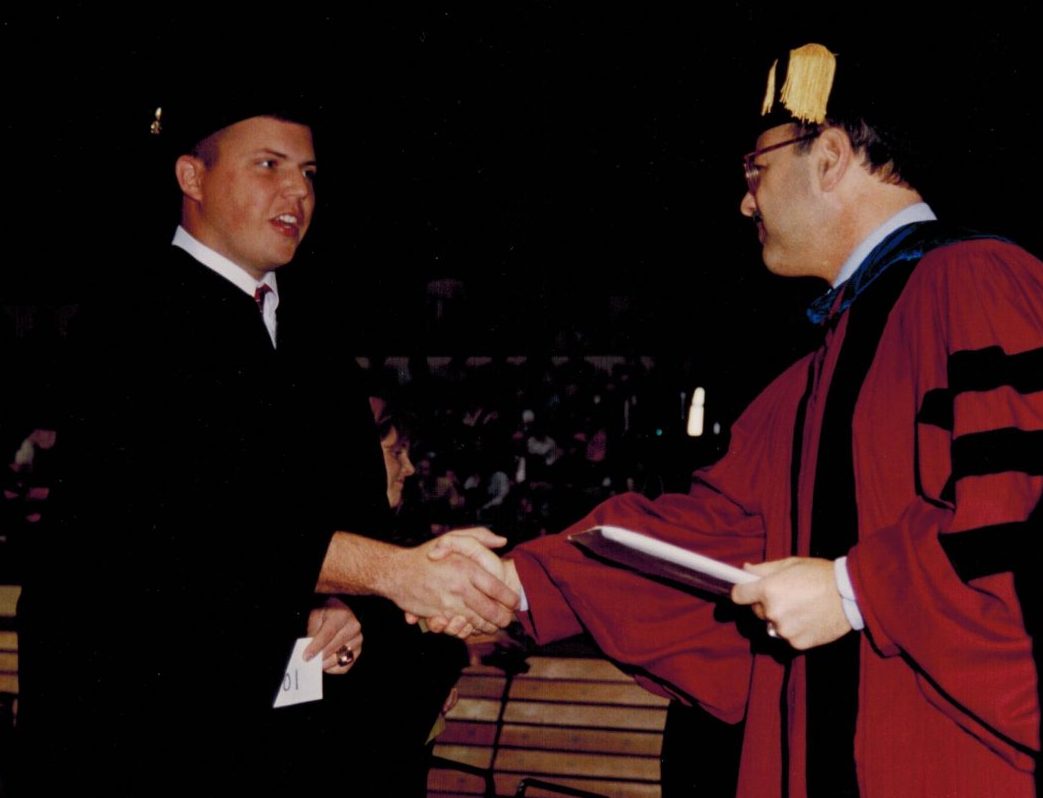
Q: You’re not the first guy to say that, Bryan. Many sing the praises of Dennis and Keith Zimmer…
BP: And you know, the biggest thing for me was when Coach Osborne took the negative rap for some of those guys who went out and did dumb stuff. It just pissed me off when some of the guys went out there and gave the team a bad name. There were enough guys out there doing good and nobody ever gave them much credit.
People ask me all the time, they asked me what Lawrence Phillips was like. I remember he grew up in a foster home, I remember Coach saying he’s probably never had a family before. He’s probably never had anybody that would guide him. His freshman year, that’s the only thing I remember about him, his freshman year he got into a fight with another guy in the locker room. I’m sure he beat the kid up, if I remember.
But he was fine, all the years I was there, to my knowledge I never ever saw him have any problems. Always talked to him, say “Hi” to him, he was just like everybody else. But in those later years, the trouble he ran into? It was a shame, just a shame. He was a truck, he had it all. He had the size, the power, the speed. He should still be playing in the NFL. He was that good.
Q: Any of the other guys stand out to you?
BP: I’ll be the first one to tell you, I’m not a huge fan of Tommie Frazier. He was put on a pedestal when he got there. He was good. Coach held him up there on that pedestal and took care of him. He knew he was gonna take the team pretty far. I mean, that was his boy.
I remember Coach coming into the team meetings, everybody was quiet. Except Tommie. He was always kind of joking with him, and Tommie had a different relationship with him, because he was working with him all the time. Tommie would be the guy always playing pranks on Coach Osborne. He didn’t treat the guys like they needed to be treated. Jared Tomich one day asked him to sign a helmet, autograph a helmet for somebody, and he wouldn’t do it. Jared said, “If you don’t sign this helmet, I’m gonna kick your ass.” He had to threaten the guy to get him to sign the autograph. And it was pretty common, guys would circulate stuff around the locker room to be signed, and everybody did it. But he wouldn’t do it, he was too good for that stuff. He wouldn’t give you the time of day.
Q: And Brook Berringer?
BP: Brook was a big quail and pheasant hunter, I’m sure you know that. As far as Brook, he was a hard working guy, he came in and put his time in. I don’t have anything but good things to say about Brook.
And when Matt Turman was running the show, all the guys did everything they could to protect him. A little guy coming out of nowhere, we did our best to take care of him. And when he played, like I said, it was the offensive linemen’s attitude, it didn’t matter if the other team heard the play or not, or who the quarterback was, we were gonna run the ball over you. That was the mindset that Milt instilled in us.
Q: How did you know if Milt was unhappy with you during the game, with him being up in the box?
BP: He came down at halftime. But he had a pretty good feel for the guys, and he’d get on you as you were right there. And sometimes he’d get Dan (Young) to try to get on you, but that never really worked. (laughs) Dan wasn’t a real motivator. That just wasn’t his style, you know.
And another story: the year we played Florida State and we were 17 point underdogs, Lance Lundberg -there was a kid from Bradenton, Florida, he went to the same school as Tommie, a little defensive back– Lumpy (Lundberg) ended up blocking him one day, we were just wearing helmets. Anyway, this little guy ended up punching Lumpy. He sucker-punched Lumpy in the locker room. It was big deal and they ended up sending the kid home from the bowl game. But what they ended up doing, some of the black guys thought it was racially motivated, that they sent the kid home.
And talk about the Unity Council, the team got together without any coaches and talked about it, and that was one of the big things that brought us back together. This was down in Miami getting ready for Florida State. Lumpy had a black eye for that game. I apologize for not remembering the kid’s name, but that was something that really stands out to me.
Q: One more question. Any strange routines or superstitions?
BP: I remember for me, my senior year. The Pipeline, all the starters, where they’d pull the white socks up over their calves? Aaron Graham started that, the O-line. And my senior year I’m not the starter, I had to rebel -my thing being the second string guy- I had to do just the opposite of that. So I wore little ankle socks with the hightops, but you can’t see them in the high tops. I took my shoes, wiped the little Converse sign off it, and it looked like I wasn’t wearing any socks at all. So, being different, I wore ‘em down all the time. It was a spirit-filled group, that’s for sure.
Q: And you said Milt would get on you pretty good?
BP: Like I said, when we were down in the pits he would definitely get on the guys. He let you know you weren’t in high school anymore.
Q: And what about Charlie McBride?
BP: Oh yeah, absolutely. I had a really good bond with him. Because I went to Morgan Park Academy, and I think he was over in Beverly on the South Side of Chicago. He always kind of had a special thing, being from Chicago. He would always come over and talk to me and ask how things were going. I always got the impression he looked out for me.
And he was nuts! (laughs) He wasn’t like any other coaches. I guess, being a defensive coordinator/defensive line coach, he had to be that way, and having the defensive linemen that he had -Raemakers, Parrella, the Peters- you’re just living with a bunch of goofballs, guys that weren’t all there, you know? He was definitely the right one to be leading that group.
What an awesome guy, though. I don’t have anything but good things to say about Charlie. He would definitely get in a guy’s face and let him know what he’s thinking. Grab them by the facemask and spit, whatever. He got on guy’s asses. He worked the defense like no other coach. He put his guys through the paces, every day, intense.
The offensive linemen? You can be intense, but you can’t be intense the whole time. Being O-line, there’s a lot of thinking involved, they’re just a different breed. I think so. You had your defensive linemen for a reason: it’s not because they were really good at doing something. Some guys are offensive linemen and some guys are defensive linemen, there’s a lot of thought process going on. With defense they’re just reacting to what’s happening.
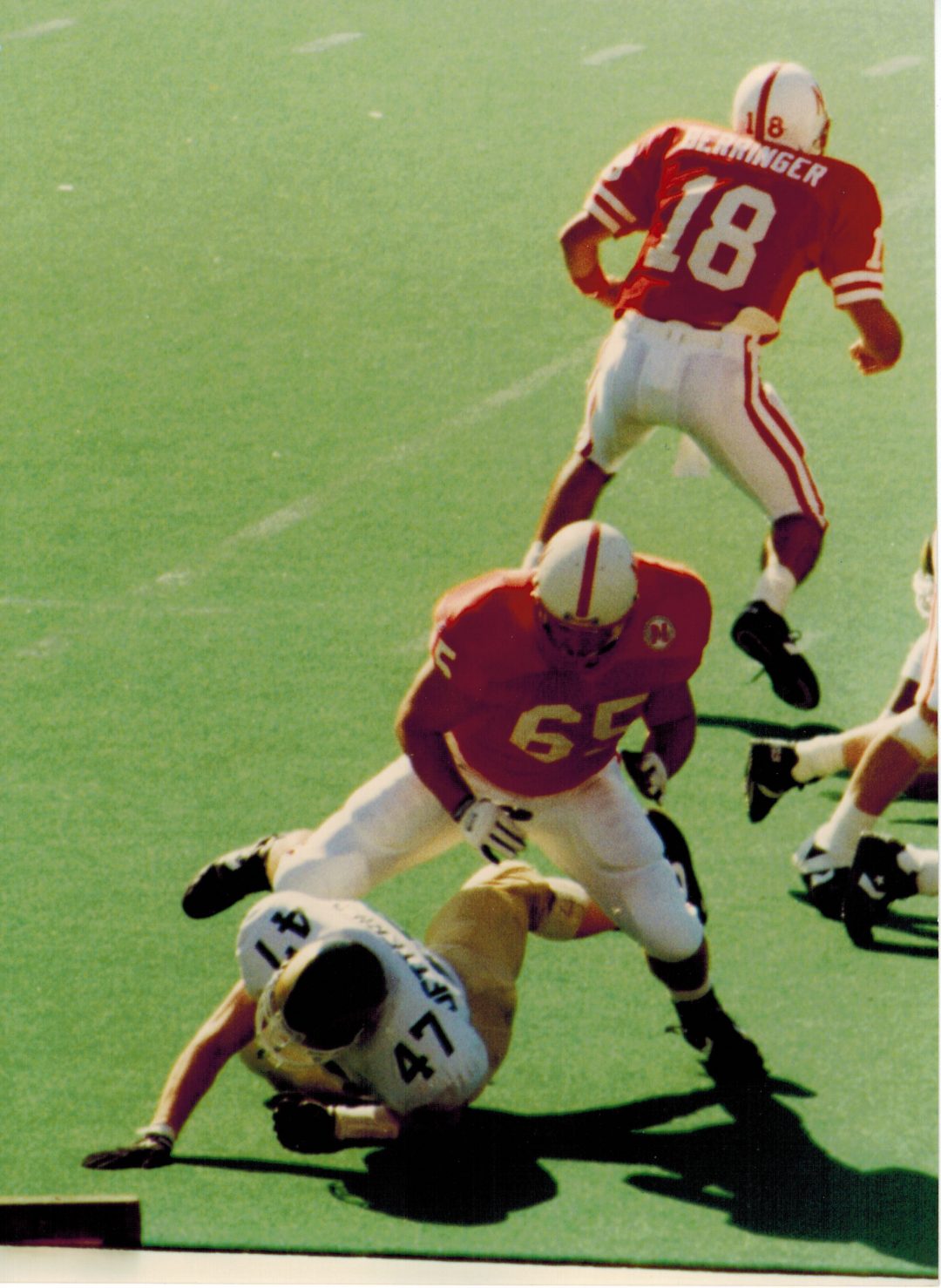
Bryan Pruitt showing ’em how it’s done
Q: And your mindset going into a game? Game prep? When it came time to play? Was it confidence, cockiness?
BP: Coach would always stress -for the second and third string guys, when you got in- they could handle mistakes, but they couldn’t take mental mistakes, ‘cause if a quarterback got hurt because you screwed up mentally, it wasn’t good, they wouldn’t have it. And they wouldn’t put you back on the field because they’d lose all confidence in you.
For me, we’d come in on Friday and we’d take a game test. We’d actually… Coach would have however many plays on a piece of paper, he’d have 7 or 8 different defensive plays on the paper, and you had to draw not only what you were doing, but know all 6 offensive line positions, including tight end. And that was for each play.
And Nebraska Football during those years, there was no way you could come into that system and play right away in two years. It took 3 years to actually learn it, to be able to do all 6 offensive line positions. As far as transitioning to the game it wasn’t the physical aspect, it was the mental aspect. That’s what was expected from you, and once you did know what you were doing that’s when you could excel, because you weren’t thinking anymore. You just went out and did it. Because you’d seen it in practice so many times.
That’s where the coaches really got good at getting guys ready for the next team, showing them the defenses and what they’d seen in film. Basically, what I do for work now.. SWAT? We practice it and rehearse, and then sure enough, come game time we’ve seen it before; we do the same thing we’ve done a thousand times before.
Q: Being on a SWAT team, you’ve seen some pretty intense situations, huh? Dodged a few bullets?
BP: I have. Yes, I have. Basically what I do now is what I was doing playing football at NU. It’s like playing football: there’s 10 other guys on the team with you. We’re basically a fine-tuned orchestra and were counting on the other guys to know what they’re doing. A lot is at stake: your lives.
I don’t worry about the guys next to me. I know they’re doing what they’re supposed to be doing. I’m not spending my time looking around to check on the other guys. I’m able to focus and just react. For me, a lot of that comes from football, that’s where I developed all of that. I think that’s why I’m so good at what I do now, is because of football.
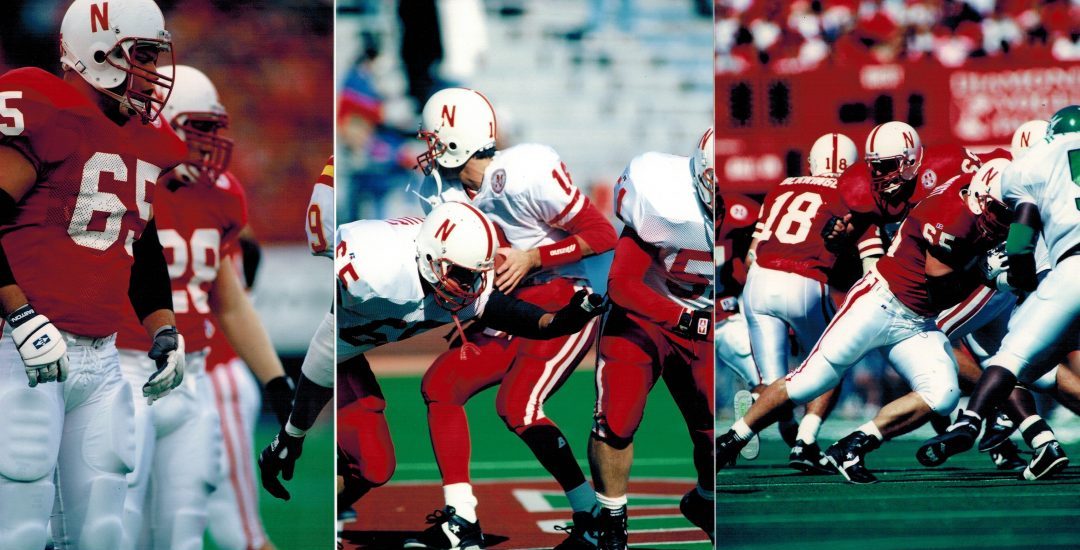
Q: Matt Turman said the quarterbacks were told they could never run out of bounds. Do you think that helped create some unity among the team? That even those guys were always taking and giving shots out there?
BP: Yeah, it could have had a part. I know that for us it was ‘pancakes.’ They were a big thing: Pancake blocks. Milt always had a big board up there in his office where he tracked the most pancake blocks. That was taking the opponent and ‘flat-backing’ him. And you know, I think a lot of those teams, they pitch the option and things like that, they pitch the ball and then they just jog the other way? Well, with Matt and Tommie and Brook, they were out there trying to make blocks.
I think that had a lot to do with it, that those guys were out there busting their ass, too. They weren’t prima donnas. Absolutely. And I always remember those receivers practicing, Ron Brown and those guys worked harder than you’d believe. They learned to block hard before anything else.
Q: David Seizys talked about getting in there at the end of games and punching guys in the thigh and getting cussed out by the opposing DB’s…
BP: You’ve got to remember, it was like throwing meat to the wolves. Our second and third string guys would bust their ass all week in practice, and now was their chance in the spotlight. They’d finally have their chance to perform and get after it. It was chance to make a name for themselves. It was a good group of guys.
I remember a lot of times the other team was like, “What the hell is going on here?” They’re frustrated, they couldn’t believe that here comes another crew of guys on the field to kick their ass! (laughs)
Q: Do you ever remember any team or any game where they essentially said, “Please, let up on us!?”
BP: UCLA a little bit, when we played ‘em at home in ’94. I was on the team when we went out to UCLA when they had J.J. Stokes, the big receiver. Those guys pretty much gave up a little bit, I remember.
Most teams, when they were playing Nebraska, were like, ”Hey, this is our big chance. Our chance to shine,” even when they were getting beat, they were still playing us tough. I was talking to somebody the other day, too, and Utah always seemed to give us a good fight. That was before Urban Meyer passed through there. I remember when they came out, they really played us tough.
Q: Anyone take you under their wing and help you along when you first got rolling there?
BP: No doubt, it was Brenden Stai. Brenden learned from Will Shields, and those were the two guys I backed up, Will and Brenden. I think it was just taking care of the guys underneath you.
I remember sitting with Brenden at the locker and just talking, and when I didn’t understand something I’d explain it to him and he’d explain it to me, or whatever. He always took care of me and made sure I knew what I was doing and that everything worked the way it was supposed to. And the funny thing is, we were essentially about the same age, but for whatever reason he was always a good guy and looked out for me.
I don’t know if you remember, but it was our big, top-secret thing for the ‘94 Orange Bowl: Brenden was right guard, and as soon as we got home from the OU game they switched Brenden to left and put Joel Wilks at right guard. They didn’t want anybody to see that until the game.
Q: How did you guys, as linemen, take that move? Were you all sold out for it?
BP: Oh, absolutely. Joel did it for the team. Basically Coach came in and said, ”(Warren Sapp is) gonna be a problem for us, and the best matchup right now is gonna be Brenden there over the top of him, taking him on.” You know, I don’t think anybody had a problem with it.
You know, that’s pretty uncommon, after about 10 or 11 games to take a guy and move him, practice him a couple of weeks and basically switching his position, because everything is completely different. I think what he accomplished that game was huge. And being a part of the system for so long probably helped him do that, for sure.
Q: How did you guys grade out in that Miami game?
BP: You know, Paul, I don’t think I ever saw grades on that game. That’s a question you’d have to ask Milt. I‘m not sure.
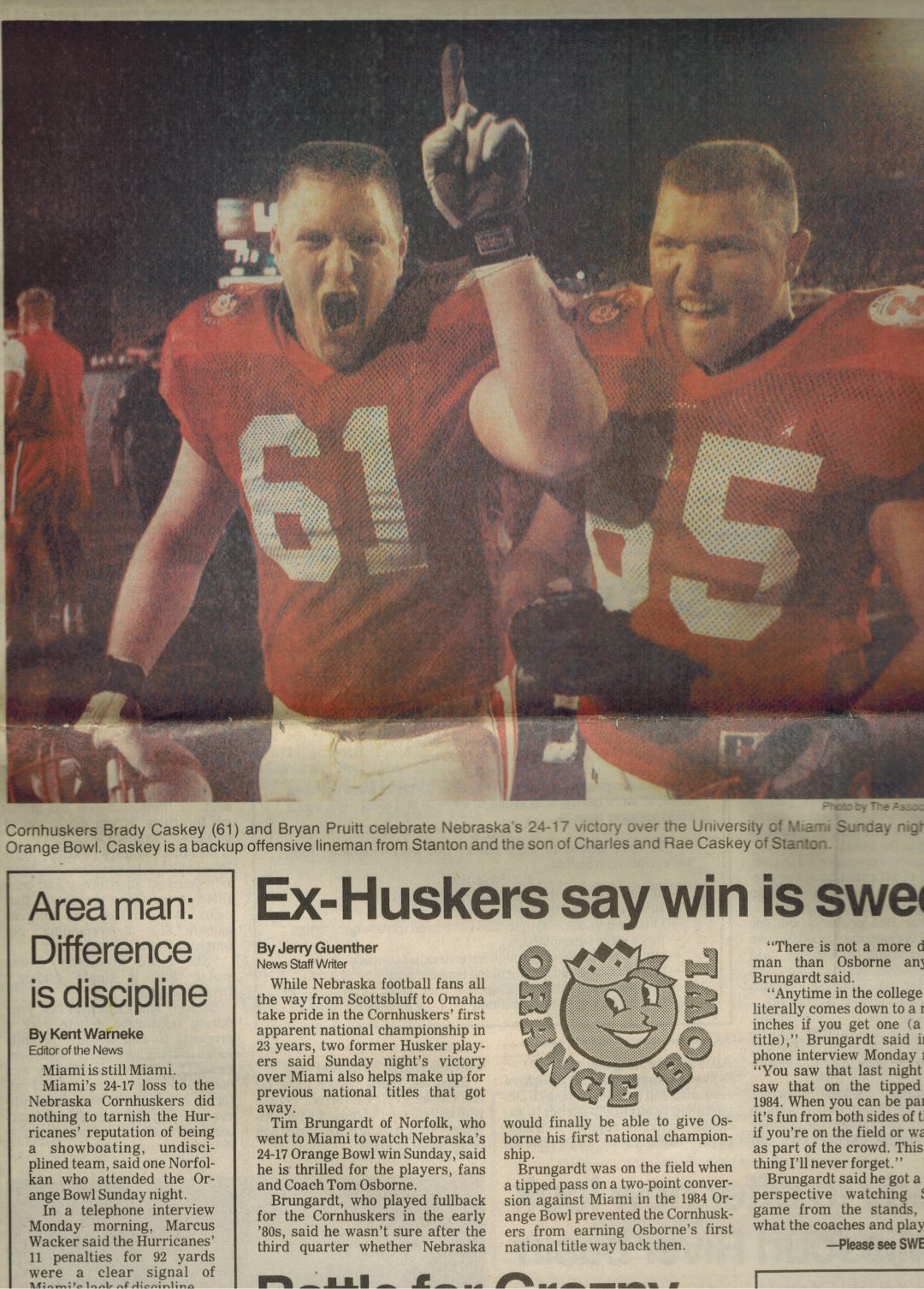
Q: And the Florida State game the previous year?
BP: Oh, I’ll be honest with you: I’ve seen the kick, but I don’t think I’ve watched the game. Ever.
I have the game downstairs, but I’ve never watched it. If you break that tape out again, I was the left tackle on the kick. I remember that field, planting my left foot against one of those Alexanders for FSU. He played a few years for the Minnesota Vikings, that’s who I wound up blocking. I stepped and my feet gave out on me, and you can see I end up on the ground.
And he got a pretty good push and someone comes up, over the left side of him and gets really high. I don’t know the kid’s name. I always wondered, because I gave up a little ground on my block, ‘Did that screw up Byron and affect him and his kick?’, you know? I always wonder if that may have contributed at all, you know? I sure hope not, but you think about it sometimes.
Q: You know, sometimes us Husker fans on the West Coast get together in the offseason and watch an old game to get the juices flowing for the upcoming season. And call me sick, but I love watching that ’94 FSU Orange bowl game. It was a great struggle and you guys gave the most tremendous effort that I ever recall. It was a war. I remember being so proud of you guys.
It seemed the team crossed a threshold that game, and you knew that it was yours for the taking thereafter. Too bad 1:15 later it was to be otherwise, though. It was yours. And the next year you guys, as a team, made sure that you went out and proved to the rest of the world that you were as good as you knew you were. Would you agree or am I full of it?
BP: I agree with that 100%. The other thing about that, too -and correct me if I’m wrong- but I don’t remember the guys complaining or whining about it too much, either. That’s a blow we were dealt, and it was up to us to make sure there would be no doubt the next year.
And I was talking to T.J. Slansky at the Spring Game this past year and I asked him that question. I said, ‘Hey, let me ask you how you felt about missing the national championship on that kick, and then watching your team the next year go out and win it. Were you pissed?’ He said, “No, man. All of the guys were proud of what you guys did.” That was pretty cool. We felt that way, too, it wasn’t just for us guys but for all those guys before us, too.
End conversation.
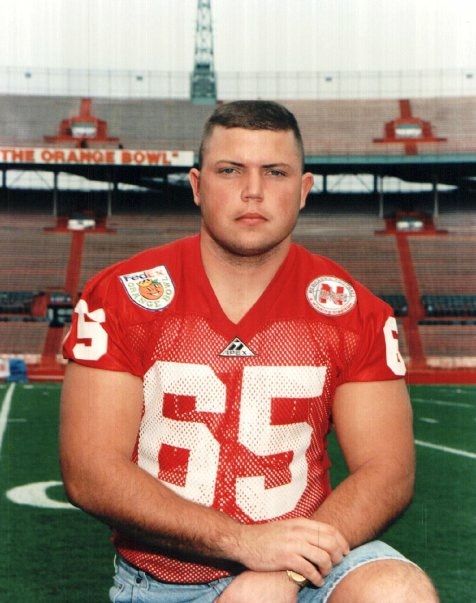
Wow, how rich was that? We touched on so many issues here, it’s difficult to focus on simply one or two. But in the course of my great Why and How I must make some choices, and the first issue that clamors for attention was his mention of Team Psychologist Dr. Jack Stark and Nutritionist Dave Ellis joining on, as well as, ”This is how we did things in the past, but those didn’t exactly work, so we’re going to change things.” It brought to mind Mr. Collins’ book where he made the point that, ““Stop Doing” lists are more important than “To Do” lists.”
What did Nebraska Football stop doing? If memory serves, they stopped going after so many of the blue chippers for a specific position, per se, in recruiting and instead looked for “Nebraska guys,” student/athletes who had speed to burn and the capacity to move closer to the line of scrimmage on the defense, in particular. Plus, instead of the assistant coaches only recruiting their assigned regions of America, they were allowed to personally target the players they coveted no matter their geographic location. The result was athletes’ greater familiarity with their primary mentors in the early stages of recruitment rather than mere acquaintance-ships until they arrived on campus in the fall. The bonds between coach & athlete were then closer, and this as a result led to better communication, more effective teaching, and often more proficient play at an earlier stage in their careers.
One could argue that Bryan stated just the opposite too, though, for he mentioned the lack of mollycoddling and ongoing personal attention at the outset by Offensive Line Coach Milt Tenopir. At first glance one would suppose there was a conflict within the system, but in thinking about it further I’ve come to the conclusion that it was designed, it was for a purpose and, moreover, it was proper. I say that because it separated the men from the boys, the leaders from the laggards, the “Want To Be’s” from the “Have To Be’s”, as Bryan mentioned about Boyd Epley’s line drawn in the sand that early January meeting of 1991.
Many books have been written on the concept of motivation and what roles both intrinsic and extrinsic motivation play in the workplace environment, and all signs point to intrinsic motivation (that derived from within a person) as being the prime driver of a majority of successful people and organizations, with extrinsic motivators such as compensation or perks playing a close but noteworthy second fiddle. Bryan began his playing career as a Prop 48 walk-on, so one can see how that ordering played out in true-to-life form.
Two other items of note: One was his mention that, “..if you weren’t 100% focused on getting the job done and maybe thinking about leaving and calling other schools, we just didn’t miss you much in the end.” This further convinces me that the “Get the right people on the bus and the wrong people off the bus” axiom was coming into being as a part of the team culture. I find it reminiscent of the “If you’re not for me, then you’re against me” line of thought. And with the ample number of volunteer walk-ons from both in-state and out, I can see how this was a comfortably fashionable mindset. Also, in speaking of the ‘right people,’ my hat goes off to Brady Caskey, his offensive line mate, who chose to forgo his Nebraska schoolboy dream of a scholarship just so this Chicago-area friend and his family could have life a little easier on the fiscal side of the family ledger. If that isn’t a fine example of love, of brotherhood, of sacrifice, of unity and cohesion, I don’t know what is. God bless you, Brady Caskey, wherever you are.
Notable quote #2:
Bryan Pruitt on Coach Tom Osborne: “The only thing he cared about were his guys: the guys in the room, making sure they were going to school, making sure they were taking care of their family and just getting better. I think the winning for him was secondary.”
Copyright @ 2013 Thermopylae Press. All Rights Reserved.
Photo Credits : Unknown Original Sources/Updates Welcomed
Paul Koch